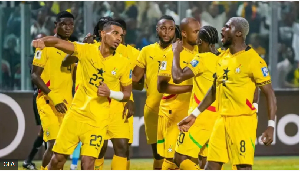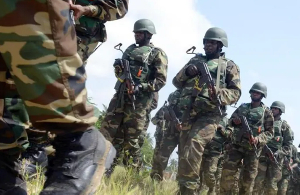By Anna Boiko-Weyrauch, Karen Attiah
Like many places, radio hosts in Ghana invite listeners to call in and comment on-air during live talk shows. Sometimes the callers just call in on a whim. But most of the time in Ghana, dedicated serial callers, as they are known, have come to dominate the airwaves.
"Well, welcome back," said a radio show host. "This is the talk back segment of the Citi Breakfast Show, I'll start taking your calls."
In Ghana, radio stations pride themselves on live talk shows where they invite listeners to call in with their comments.
"Mohammed is calling from Dansoma, and he's my first caller. [Hello my brother.] Mohammed good morning, welcome to talk back on the Citi Breakfast Show. [thank you]."
Ghana has freedom of the press and freedom of speech. But most people like Mohammed who phone into talk shows, don't do it on a whim. They call themselves communicators, but to most Ghanaians, they're serial callers.
"I spoke on Pink FM," said Christy Nkansah. "I spoke on Great FM. I spoke on Top Radio…"
Serial caller Christy Nkansah.
"I spoke on Hot FM," she said. "I spoke on Happy FM. I spoke Asempa."
And that's just today. Nkansah is middle-aged, and has been calling into radio shows regularly for the past five years.
Right now, it's about three in the afternoon and Christy is working at her small fabric shop in the center of Accra. She tunes her radio to a program in the Ga language about politics.
"So I will listen to them and sometimes I write my points down," said Christy Nkansah.
She's got a cell phone in either hand, both dialing into Radio Universe.
"As for Universe, it's very difficult getting through," she said.
When her call doesn't go through, she dials the radio station again. The number is saved on her phone. Christy says it's like a hobby, but she also does it to support her political party, the National Patriotic Party.
"I do it because I love the party," said Nkansah. "It's my party. I've been in this party right from my infancy. Everybody, my family, we all belong to one party."
But, the political parties distance themselves from the serial callers. Frank Agyekum used to be the deputy Information Minister of Nkansah's party.
"We know that they are there, but they are not part of any formal structure in the party or in our government," said Frank Agyekum.
But he says the political parties do give them informal support sometimes, like talking points and party information.
"What we tried to do was to reach out to them by way of trying to give them information as to what to say on certain issues, and what not to say on certain issues," he said. "How to be able to counter the propaganda from the other end. That we tried to do in an informal way."
"They give them money to buy credits, they buy phones for them," said Al-Hassan Suhini. "They even give them money for upkeep."
That's Al-Hassan Suhini, a host at a leading radio station in the capital. He's convinced the parties support the serial callers with everything from air-time credits to a salary. Some serial callers concede they've gotten money for their phones, but not very much. According to radio host Suhini, the problem is that they keep other people from getting through.
"Immediately you activate the phone lines, they hijack it," he said. "You can predict. You hear Name A, you can tell the Name B that will follow."
Once his station tried to fight back against the serial callers.
"We actually made an announcement with a list of names we were not going to take," said Suhini. "When we did that, we actually had another phenomenon developing. We had a new group of serial callers, but they also became regular and were getting the lines almost everyday."
Meanwhile, the old group of serial callers was organizing to get back on the air.
"They wrote a petition to management to complain that we're gagging them and we're infringing upon their rights to free speech and they were not too excited about it," he said. "So, their protest was so strong, management had to ask us to stop."
"[Radio: five one two nine six two, five one two nine six two] I've gone through," said Christy Nkansah.
Back at the fabric shop, one of Christy Nkansah's phones got through to the afternoon program. Speaking in the local language, Ga, she starts by greeting the host, Rasheed, and saying her name.
"Ata Rasheed ago e [ame eh] Yo a choome Christy [yo Christy] Yoo ata Rasheed," she said.
Nkansah touches on a number of local issues, government management, poverty, drug dealers. She really gets into it. She also slams the other main political party. She waves her arms at the radio, paces the room and starts to break a sweat.
"NDC bi ke fie politics," said Nkansah. "Ne ni nye like it's a national issue. Nu wo few o ba ko bali ba fie..."
She looks pretty tired when she's done talking. Nkansah says there's nothing special about what she does. Anybody could go on air and say what they want, Ghana's a free country, after all.
"This is a democracy," she said. "We are in a democracy country. Nobody can tell you not to speak."
Christy says she's not done calling in today. Even after she goes home, she wants to speak on air at least three more times before she goes to bed. She says serial callers, or communicators, like her are here to stay.
General News of Friday, 2 October 2009
Source: Anna Boiko-Weyrauch, Karen Attiah












